
A Test by Jesse Lee Kercheval
1.
Well, here you are.

You made it from Montevideo, Uruguay, back to your house in Madison, Wisconsin on a plane of stranded people returning to first Chile, then Miami. And on from there on packed planes to Texas, then Wisconsin. Two days of masks and hand sanitizer and being handed food and bottled water in big knotted plastic bags by nervous flight attendants.
Calm your stomach: Alive is not a given. Alive is good. There is a lake behind your house with waves pounding as if it thought it were an ocean, but you are Inside. Compare this morning to heating water, slowly, over an open flame. For tea. Or for washing your face. (Ignore the sense of thunder gathering inside your body). The moment you let your thoughts tighten the circle of your skin, it will be bad. Very bad. Haven’t you learned anything?
Also, you are jet lagged.

2.
Two nights ago, in the apartment where you were living in Montevideo, Uruguay, there was a terrible storm. You stood in your 7th floor living room and watched lightning streak across the sky, down from the walk of dark clouds to the water of the Rio de la Plata, so wide at this point Uruguayans all call it el mar, the sea. The lightning moved sideways, across the sky above the tall apartment towers of the city, the low old houses. Thunder shook your windows. The train hit, blowing so hard against your windows, you lowered the, the heavy metal rolling blinds, to protect them.

In Uruguay, the virus was, at first, a disease of the clase alta, the upper class. It arrived in Uruguay via the airport in Carrasco, the richest neighborhood in the capital Montevideo on flights from Italy and Spain full of Uruguayans wealthy enough to travel for pleasure or business. One woman, a clothing designer, tried to fly to Milan, only to find the city shut down. She returned home already ill, but went on to attend a wedding reception with 500 guests. The cases went spiraling out from there. She was so relentlessly mocked on social media that when Pedro Bordaberry, the son of ex-President Juan Bordaberry, the man who had brought in the terrible military dictatorship in 1973, tested positive, he felt he had to release the news in a Youtube video where he said he had definitely not attended any wedding reception.

Then there were more cases and, perhaps because everyone had seen the news from the U.S., there were lines of people in the supermarkets buying toilet paper. Then everything was closed and Bulevar España, in front of your apartment building, was as quiet as the remotest country road. When you saw other humans, they were on their balconies or rooftops, the streets below abandoned.

3.
You wake up in a dark room: the roller coaster silhouette of your body under the covers, the roller coaster you. Montaña Rusa it’s called in Spanish. But you are not a person who lives in mountains. You are a person who took two semesters of Russian in college and now remember only the sentence: Где библиотека? Where is the library? Beyond the bed, you see shoes but not shoes following the obvious form we think they have developed. Heels run down, toes defeated. Try not to think of the pink, vulnerable places on your body or your many sins. In any order. Remember all the shattered pieces of the world are modeled on the perfect Whole. Imagine survival as a strong, water-proof umbrella.
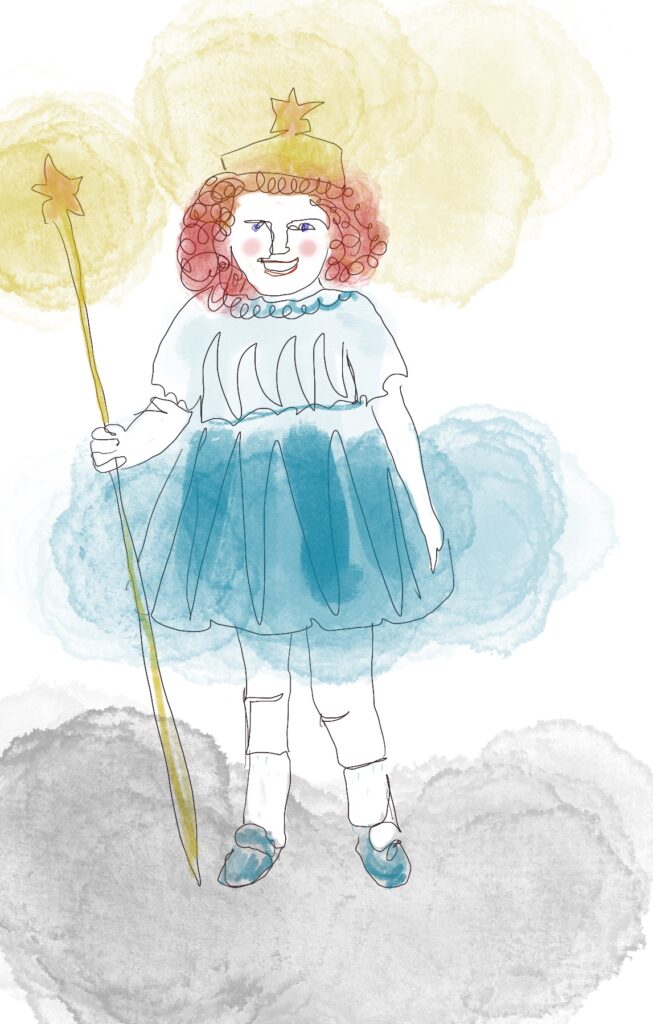
4.
The first sign of any government response you see returning to the U.S. is the local Covid test center at Dane County, Wisconsin convention center. At the airport in Miami, where you expected health checks, there were just long tight lines of people much too close together and signs asking if you had been exposed to German Measles. No one took the health forms the flight attendants on the Chilean airline had you fill out. It is hard to imagine you were not exposed on your trip—four flights, five airports, three countries, three states—so now, you are going to be tested.

When you pull up at the convention center, a single Wisconsin National Guard soldier is standing in front of a police box. He is wearing an ordinary disposable surgical mask, no N95 mask, no visor. Then again, you don’t intend to roll down your car window. He has a clip board. “Did you pre-register?” he asks through his mask, through your window. You hold up you iPhone, signaling you have your QR code ready to go. The soldier nods. “Okay, just drive on ahead then,” signaling to the drive which circles the large square convention center.
So you do just that—drive.
As soon as you turn the corner of the building, you can see there is a line of eighty or more cars. You think you shouldn’t have come now. It’s lunch hour and you imagine people using that precious free time to see if they are just feeling a bit under the weather or are really truly sick. You think about leaving, coming back another day. But there is an electronic sign assuring you from your spot to being tested will only be “15 MIN!” Plus the way out is blocked by orange cones and brightly painted wooden sawhorses, so there is no clear way to escape if you wanted to. You think, This is the story of this pandemic. No way to flee. You put your car in park, close your eyes, imagine you are in a department meeting and start to hum—
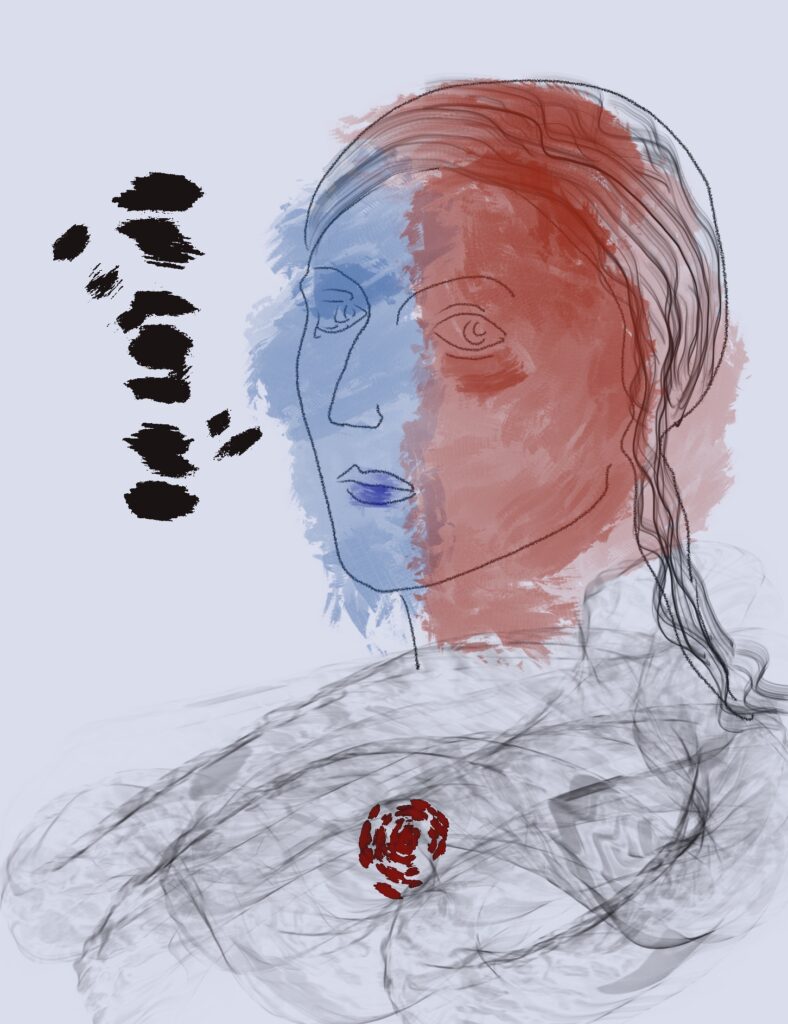
After the year, you promise yourself, you am not going to be anywhere on time ever again. If
You are anywhere.
If You are.
5.
Another guardsman steps forward, knocks on your window and then scans your QR code. The cars in front of you idle, their windows up, AC on. Most cars have at least two passengers, some three or four, whole families waiting to be tested. You know you are lucky Madison has a free testing center, that everyone in the line is lucky. You wonder if anyone really feels that way. Slowly. you inch forward toward a big metal building with five gaping garage doors. Usually these buildings are where the animals are kept during events like the World Horse Expo. You notice a sign to the right of the gaping about where to leave your manure. But inside, instead of animals, there are five lines of cars, one coming through each door, each line headed across the concrete floor toward a far clump of people in PPE, standing beside a folding table. One by one, the cars stop beside a table and someone in PPE leans inside their car.
A man with flashlight directs you to pull forward. Your turn. A woman in full gear appears at your window. “I am going to insert a swab an inch into each nostril,” she says. And she does. Left. Right. But it feels like way more than an inch. It feels she is swabbing your brain. Stabbing your brain. You should hear the results in three to five days, she says. Call the number online if you have not heard in five.
You drive out into the sunlight. Your nostrils burn like you have breathed in chlorinated pool water. Your eyes water. Your sinuses feel as if they are on fire. It feels, you think, like you’ve snorted horseradish.
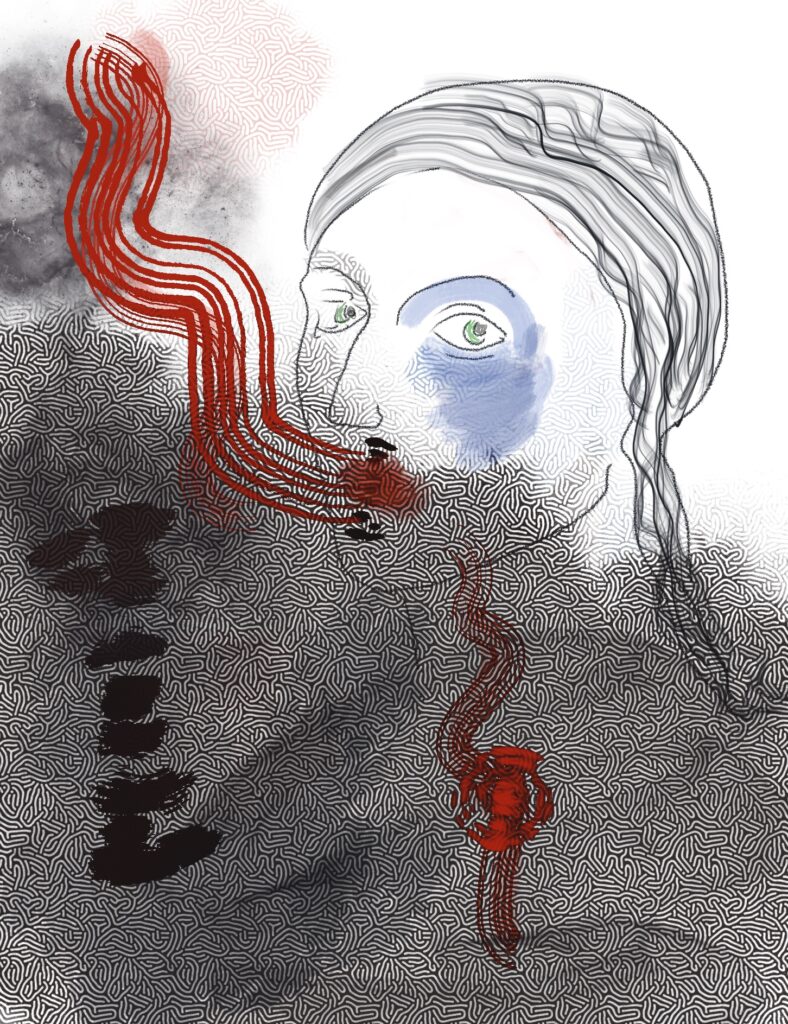
You drive home, feeling slightly elated and also worried. Three to five days. By then you will probably already be sick enough, if you are positive, to know the results before you even get them. Three to five days. Your mother told you once that all her life she’d felt like there was a big black shoe over her head, waiting to come down. Now you feel it, like a big black boot, hovering over your head. You email a friend.
At least you can write about it, she says.
So you do.
6.
Think of your spinning thoughts as a Science Experiment. The lake is blue. Blue water out to the edge of the world where it meets the blue sky which is itself a blue lake in the calm calm calm—is it calm?—silent—is it silent?—blue black blood of space.
Communicate with Nature: it is calmer now and the sun is out. Sit on the deck. Sun is good for you. Look at the lake, blue, calm, dotted with Canada Geese, resting on their long journey south. Years ago you stood on a different beach and saw a Space Shuttle blast off. Years ago you saw one rise up and then explode. What do you remember now about O-rings and resistance? Nothing.
“You really want,” you think. “You might,” you add. “You would have liked,” you almost start to say.
But then what?
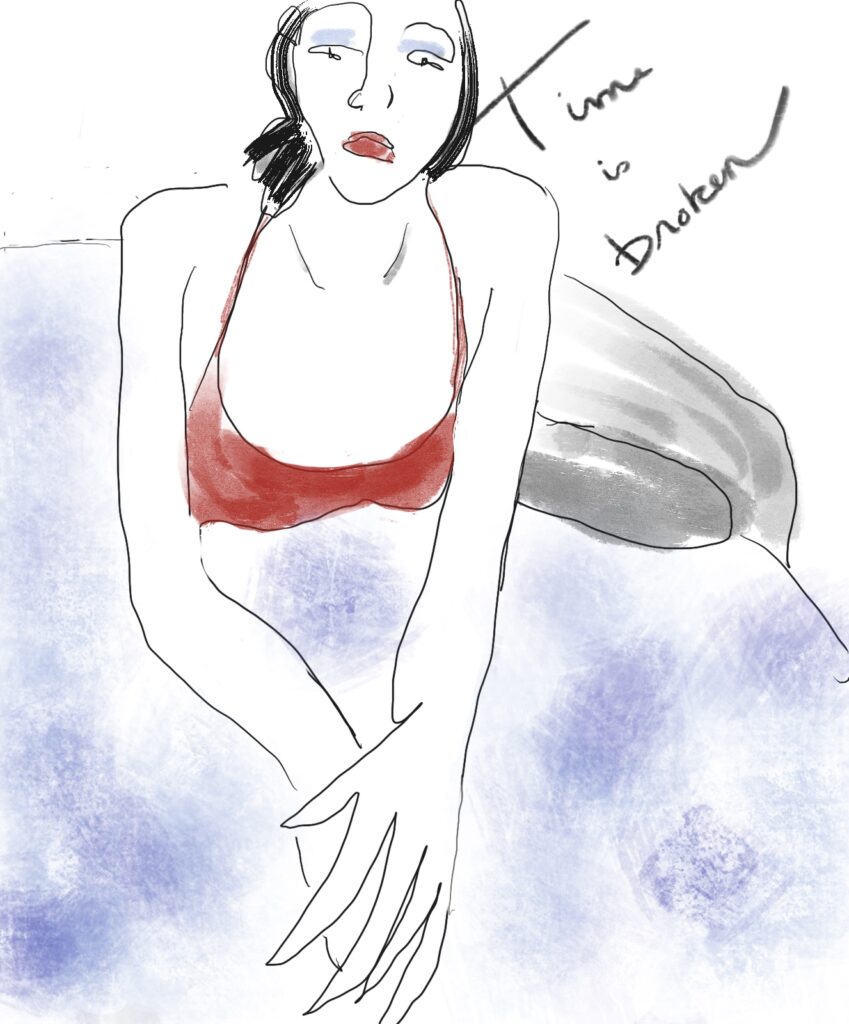
7.
If you are positive, you’d been told, they will call. They do not call. You get an email after three days. You are negative.
You wait to feel happy, elated, relieved.
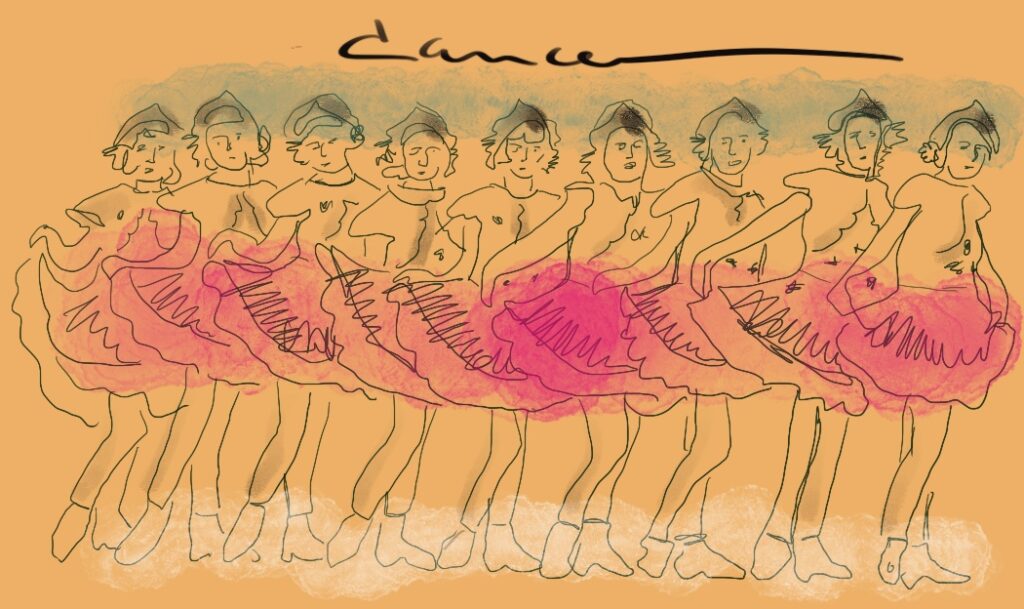
You feel none of these things.
Since the test, you have been to the supermarket, much more crowded than in Uruguay, where only some of the people were wearing face masks. And to the drug store, where everyone was but no one stayed six feet away. So, you realize, you are not really negative. You are never really going to be negative. You are going to have to live, moment to moment, not knowing if you are sick, but just haven’t realized it yet.
Still today, the email says, your result says negative.
Negative is positive.
8.
You step outside, where there is no one closer than six feet and take a deep breath. Today, you feel fine. Today is sunny. Lovely. Lovely. Lovely. You could kiss it.
You could die for it.
And so we may. And so we may.

Jesse Lee Kercheval is a writer, poet, artist and a translator. Her recent books include the poetry collections America that Island off the coast of France, winner of the Dorset Prize, and La crisis es el cuerpo (Editorial Bajo la luna, Argentina, 2020). Her poetry book, I Want to Tell You, is forthcoming from the University of Pittsburgh Press. Her recent essays have appeared in Guernica, New Letters, and The New England Review.
9 June 2022

Leave a Reply